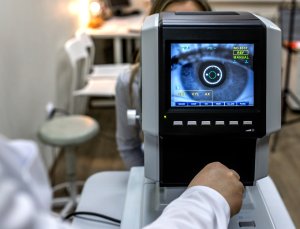Macular Degeneration Treatment Schuylkill County

Voted Best of Berks—
eight years in a row!
Age-related macular degeneration (AMD) is one of the leading causes of vision loss among people age 50 and older. If you live in Schuylkill County, take advantage of the AMD treatment options that are available at Eye Consultants of Pennsylvania by having your eyes examined regularly.
Our experienced team provides state-of-the-art AMD care in Berks County, Schuylkill County, and throughout Eastern Pennsylvania, using the latest techniques and treatments. All of our doctors are board certified by the American Board of Ophthalmology and continually update their skills and knowledge to offer patients the latest advancements in eye care.
Barry C. Malloy, MD, Michael Cusick, MD and Anastasia Traband, MD are our fellowship-trained, board-certified vitreo-retinal specialists who specialize in the treatment of macular degeneration, diabetic eye disease, retinal detachment, macular edema and many other conditions that affect the retina. They will evaluate your eyes and help you manage macular degeneration before it causes severe vision loss.
Barry C. Malloy, MD, is board-certified and completed his vitreo-retinal fellowship training at the Washington Hospital Center. He specializes in cutting-edge treatments for detached retinas, including the use of intraocular injections and surgical tools for complex retinal detachment repair.
Michael Cusick, MD, is board-certified and completed a medical and surgical vitreo-retinal fellowship at the Duke Eye Center. He specializes in vitreo-retinal disorders, including retinal detachment, macular holes, diabetic retinopathy and other conditions of the retina and vitreous.
Anastasia Traband, MD, is board-certified and completed her vitreo-retinal fellowship at the Sheie Eye Institute at the Penn Medicine Hospital at the University of Pennsylvania after receiving her medical degree at Jefferson Medical College in Philadelphia. She specializes in vitreo-retinal disorders, including retinal detachment, macular holes, diabetic retinopathy and other conditions of the retina and vitreous.
The Stages of Macular Degeneration
There are three stages of AMD – early AMD, intermediate AMD and late AMD. They are typically characterized by the size and number of “drusen,” or yellow deposits, underneath the retina. It is normal to develop some very small drusen as you age, but the presence of medium-sized to large-sized drusen may be an indication that you have AMD.
Early AMD – The presence of medium-sized drusen, which are approximately the width of a human hair, may indicate that you have early AMD. In most individuals, early AMD shows no symptoms or loss of vision. The drusen can only be detected during an eye exam.
Intermediate AMD – This stage of AMD is characterized by the presence of large-sized drusen, pigment changes in the retina, or both. Again, the drusen can only be detected during an eye exam. Most people do not experience any symptoms, and overall vision loss may go unnoticed, particularly if you have AMD in only one eye.
Late AMD – Individuals with late AMD already have some loss of vision but, if the AMD is only in one eye, the vision loss may not be noticeable. There are two forms of late AMD:
- Dry AMD – Nearly 90% of all people with AMD have dry AMD, and all people who have wet AMD had the dry form first. Scientists are still not sure what causes it, but studies suggest that part of the retina becomes diseased, leading to the slow breakdown of the macular cells and a gradual loss of central vision.
- Wet AMD – This less common form of AMD is responsible for the most serious loss of vision. Wet AMD occurs when new blood vessels grow underneath the retina and leak blood and fluid under the macula. This causes rapid damage to the macula and can lead to blind spots in your central vision.
Macular Degeneration Treatment
The only way to detect AMD is through a comprehensive dilated eye exam. If your eye doctor finds that you have AMD, the treatment will depend on which stage the disease is in and whether it is the dry form or the more advanced wet form.
Currently, there is no medical treatment for early AMD or dry AMD. Studies have been done that suggest that certain vitamins and minerals, such as zinc, lutein and zeazanthin, may slow the disease’s progression. You should also have a dilated eye exam every year to determine if the AMD is advancing.
Wet AMD can be treated with laser surgery, photodynamic therapy (PDT) with or without injection of steroids into the eye, and the painless injection of drugs such as Lucentis, Eylea, Macugen and Visudyne that attempt to stop abnormal blood vessel growth in the retina. Lucentis has been shown to improve vision in a significant number of people with macular degeneration. But AMD and vision loss may still progress in spite of the treatment.
To learn more about macular degeneration treatment in Schuylkill County, contact Eye Consultants of Pennsylvania and our retinal specialists. We have five convenient locations in Pottsville, Wyomissing, Pottstown, Lebanon and Blandon. For an appointment, call toll-free 1-800-762-7132.
Find a Doctor
Physician information including education, training, practice location and more.
Schedule an Appointment
Call 800-762-7132 or make an appointment online.





